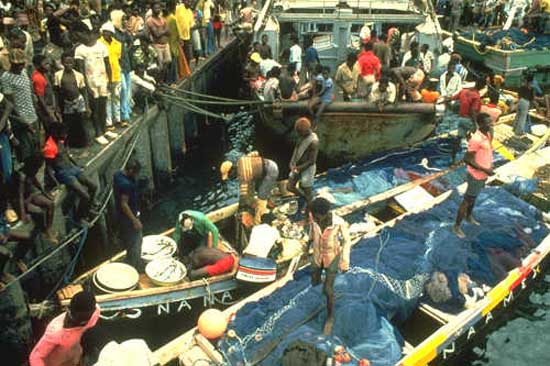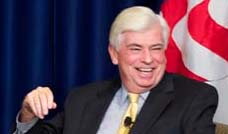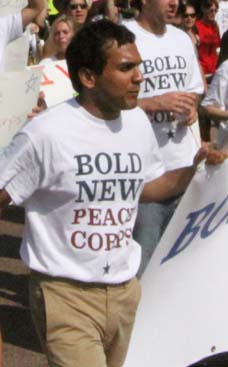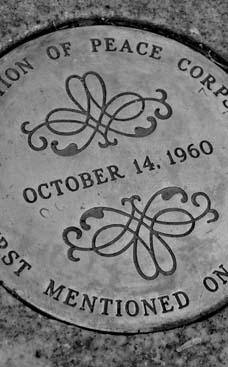
As a volunteer in Togo, Connor got "used to living with the people the way the people live," he explained. That included living with a family in a mud hut and eating their types of meals, as well as surviving with no electricity or clean water, which Connor admits he missed the most. He had to get used to boiling and filtering his water to make it drinkable, and "squatting" as a substitute for flushable toilets and bathrooms. "You learn to grow up in a very different way. That's something that I really respected," he said. While living in conditions that emphasized the poverty of the area, Connor spent his four years in West Africa doing work to combat the clear economic disadvantages that the people of Togo faced. With the priorities of fuel and clean water in mind, he helped find some of the solutions to poverty by helping to create solar energy cookers, hot water heaters, improved cook stoves, and water cisterns, since the country can go four months without getting a drop of rain. Connor got to fulfill his long hoped for dream to join the Peace Corps when, in his mid-twenties as a British national, he was naturalized in this country, and as an American citizen, he applied and was admitted as a volunteer. After living in Togo for 4 years, Connor returned home for some time, only to return to Africa and then South East Asia, again as a volunteer. Upon returning to the States three years ago, he began his work with "Save the Children."
Sam Connor recounted his four years of service as a volunteer in Togo, West Africa
To Togo and Back: Peaceful International Work
October 20, 2010
By: Jamie Gallerani
Scorpions. Malaria. Dysentery. Even in a country with horrors like these, the impoverished people who dot the landscape have even bigger problems to deal with.
Sam Connor, a former Peace Corps volunteer, knows this first-hand. While speaking at Fairfield on Tuesday, Connor recounted his four years of service as a volunteer in Togo, West Africa. He now serves as the director of "Save the Children" in Westport, Connecticut.
According to Connor, the majority of the world does not live the same comfortable lifestyle that we as U.S. citizens live. This truth was unavoidably revealed to him during his field experience in Africa, and has subsequently affected his interests, passions, and life work.
"When you go [to Togo], you feel so much more privileged than they are. I was always happy to help…It really launched me on this career of social justice and humanitarian work," he said.
As a volunteer in Togo, Connor got "used to living with the people the way the people live," he explained. That included living with a family in a mud hut and eating their types of meals, as well as surviving with no electricity or clean water, which Connor admits he missed the most.
He had to get used to boiling and filtering his water to make it drinkable, and "squatting" as a substitute for flushable toilets and bathrooms. "You learn to grow up in a very different way. That's something that I really respected," he said.
While living in conditions that emphasized the poverty of the area, Connor spent his four years in West Africa doing work to combat the clear economic disadvantages that the people of Togo faced. With the priorities of fuel and clean water in mind, he helped find some of the solutions to poverty by helping to create solar energy cookers, hot water heaters, improved cook stoves, and water cisterns, since the country can go four months without getting a drop of rain.
Connor got to fulfill his long hoped for dream to join the Peace Corps when, in his mid-twenties as a British national, he was naturalized in this country, and as an American citizen, he applied and was admitted as a volunteer. After living in Togo for 4 years, Connor returned home for some time, only to return to Africa and then South East Asia, again as a volunteer. Upon returning to the States three years ago, he began his work with "Save the Children."
Audience members seemed to have similar thoughts and feeling about Connor's lecture and the work that he has done in the Peace Corps, referring to him as informative, honest, insightful, and candid. "His passion resonated with me," a woman in the audience said. However, she added, "I think there are some aspects that weren't covered and I'd like to learn more."
When asked what main point they took away from the lecture, Fairfield faculty member, Professor Marie-Agnès Sourieau answered that "…volunteering for the Peace Corps is an invaluable experience for personal growth and for hopefully influencing others to see the world differently."
One idea that Connor conveyed was that his experiences really expanded his horizons and opened his eyes. Although he admits that "You have to go through a lot of changes…growth, perseverance, frustration, to get through two years of service," he also says that his experiences with the impoverished people in Togo have helped to shape his passions, claiming that "[My experiences] certainly launched me into my interest in continuing international work."













